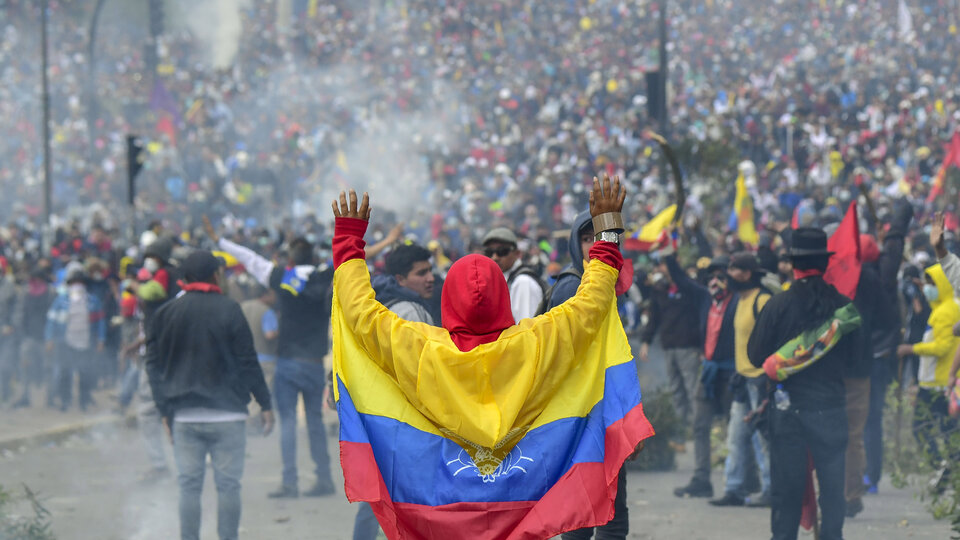
[ad_1]
Tens of thousands of people marched to Quito as part of the national strike against the adjustment led by the government of the President of Ecuador, Lenín Moreno, following IMF revenues. . The crowd was led by the indigenous movement, but unions, students, women's groups and social organizations also gathered. While the government has asked to open the dialogue, it has instead sent the police and the army to repression. In a message broadcast on public television, Moreno expressed his confidence to find a quick solution to the protests. The curfew continues.
Thousands of protesters arrived in the Ecuadorian capital this morning despite the curfew with which the government had tried to stop traffic all over the country. The Confederation of Nationalities of Ecuador (CONAIE) was the main call for the national strike day. High school students, universities, members of social and political organizations as well as the women's group joined them. Many came to camp several days in different parts of Quito while waiting for Wednesday's march. Throughout the day, they demanded the resignation of Lenin Moreno and his cancellation of the adjustment that he wants to apply with the support of the IMF. "The government is leaving, it has had enough time to show what it can do for this city and did nothing," said Diana Guanatuña, a member of the indigenous community of Zumbahua, located in the city. Andean region of Ecuador.
On Tuesday night, Moreno issued a curfew that lasted until Wednesday morning. But even before it came into force, police and the army attacked the demonstrators' camps with the help of tear gas. They did not distinguish between men, women, the elderly and children, many of whom had to be transferred to nearby hospitals. Given these facts, neighboring universities have opened their doors to welcome hundreds of people. Human rights organizations denounced the illegal detention of 83 people, who were transferred to a police station in Pomasqui, near Quito. Only today, at noon, they had access to legal assistance.
In the presence of police and soldiers stationed throughout the historic center of Quito, protesters marched under the flags of Ecuador and multicolored ancestral peoples. "Violence is not the people fighting, but the state that represses," could read on one of the many posters that they wore. They also expressed their rejection of Moreno, corruption, the IMF and the United States. "The big media say we're leaving, and no! We are there and we will continue! We are a people and only one fight, "he said during a dialogue with community media. Wambra, an indigenous activist.
In the afternoon, human rights organizations reported that hospitals did not provide any information on the wounded. They claimed that due to the state of exception prevailing in the country, all data must have been previously transmitted to the Ministry of Communication of the Government. University students have formed first aid brigades to treat the hundreds of wounded left behind by police action. It is estimated that more than 100 people were injured during the day. The demonstrations were replicated in 21 of the country's 24 provinces.
Lenín Moreno left Guayaquil for Quito where he was briefed on operational security. "Without a doubt, the problem will be solved very soon," said the president in a video broadcast by a public television channel. The ministers of his government have tried to calm the situation by calling for dialogue. They have also launched a plan of measures in favor of the sector This was announced by the Secretary General of the Presidency, José Agusto Briones, who detailed the six points that make up the measure: he proposes to work on the systems of defense. Irrigation of land, restructuring the debt of associations that have not been able to pay their plots. , agricultural insurance, 100% debt reduction to the Ministry of Water, technology kits and four product collection centers, Briones said he is in dialogue with social organizations and hopes to reach an agreement soon, according to the newspaper Trade d & # 39; Ecuador. The government has also decided to stop shipping oil from one of its main pipelines, most of which are for export.
Ecuador was boiling last Thursday, after Moreno announced several economic measures by decree, which should therefore take effect immediately. He also promoted a labor reform that should be discussed by the Ecuadorian Congress. Among these measures, the one that caused the biggest rejection is the publication of the price of fuel, driven by the removal of subsidies. The rejection of the Ecuadorian people is given for one simple reason: the increase in fuels drives up the price of public transport and basic food. Behind these measures lies the hand of the IMF. The Moreno government has granted a $ 4.2 billion loan to the agency, in exchange for a drastic reduction in the budget deficit.
The transport sector responded with a two-day national strike and mobilizations throughout the country. Moreno decreed the state of exception that allowed him to use the armed forces to suppress social protest. It also decreed the transfer of the seat of the government to Guayaquil, economic center and the most populated city of the country. Indigenous groups and social movements have called for a national strike for Wednesday. The protests continued to peak on Tuesday when protesters managed to break into the seat of the National Assembly. That night, Moreno issued a curfew that lasted until the early hours of Wednesday.
Up to now, the fierce crackdown that began last Thursday represents about 800 people arrested, hundreds injured and two dead, according to human rights organizations.
Report: Juan Manuel Boccacci
.
[ad_2]
Source link
 Naaju Breaking News, Live Updates, Latest Headlines, Viral News, Top Stories, Trending Topics, Videos
Naaju Breaking News, Live Updates, Latest Headlines, Viral News, Top Stories, Trending Topics, Videos